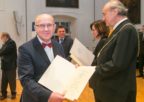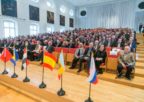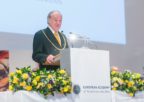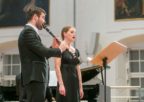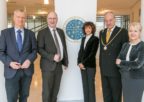The European Academy of Sciences and Arts is a non-governmental non-profit association dedicated to promotion of scientific and social progress. Among the 2000 of its members there are world’s most prominent researchers and artists, including 32 Nobel Prize winners. Recently, new members have been admitted to EASA; among them was Prof. Henryk Skarżyński MD, PhD. Formal ceremony of admission took place on March 2nd 2019 at the annual EASA meeting in Salzburg.
Academy membership provides an opportunity to collaborate with prominent experts from all over the world. It is a great honor for me to be able to participate in our shared activities and projects – said Prof. Henryk Skarżyński. – It is also an excellent opportunity to promote Polish achievements in the areas of medicine and science, such as my “Polish school of otosurgery” or the “Cochlear Rhythms” International Music Festival for Children, Adolescents and Adults providing a meeting point for the two distant areas of music and medicine. The objective of the Festival is to demonstrate that thanks to the achievements of modern medicine and science, hearing problems are no longer an obstacle for amateur or professional pursuit of musical career or for the development of one’s vocal talents. We could provide more examples of our activities that could be used as a showcase of Polish scientific and medical achievements – Prof. Skarżyński adds proudly.
The European Academy of Sciences and Arts was established in March 1990 by Prof. Felix Unger, a cardiac surgeon who had performed Europe’s first artificial heart transplant in 1986, cardinal Franz König, who was at the time the Archbishop of Vienna, and Nikolaus Lobkowicz, a politologist and philosopher.
Professor Unger has continued to preside the EASA to this day. The scope of his interests had always extended beyond just medicine; as early as in the mid-1980s, he and the late cardinal König used to hold regular meetings with prominent scientists from Vienna, Munich, Innsbruck, and Salzburg. Cardinal König was very interested in the issues of scientific ethics. On the other hand, his friend, Prof. Nikolaus Lobkowicz was concerned about the changing hierarchy of values he observed in the European society. Although each of these three intellectuals focused on different issues, together they developed the concept of an academy for dialog and collaboration between European scientists and artists so that their different perspectives on Europe’s problems might significantly contribute to the development of appropriate solutions. This idea was the basis for their project named the European Academy of Sciences and Arts.
Currently, the Academy associates representatives of the humanities, medicine, natural science, social science and technology as well as representatives of artistic and religious communities. EASA’s projects and events fall within each of these areas. The objective of the Academy is to strengthen the role of European scientific community in the development of solutions to problems considered to be of top priority for the Europeans. EASA is also involved in intercultural dialogue as a means to affirm the importance of diverse values and cultures. Starting from 1997, the Prize of Tolerance has been awarded by the academy to individuals and institutions striving for universal good and dialog between countries and religions. Another project of the Academy is the Alma Mater Europaea University in Salzburg.
EASA admits personalities representing scientific or cultural institutions or individuals with outstanding achievements in their respective areas of activity and greatly esteemed in their communities. Academy members have the right to propose new candidates regardless of their nationality or specialization. The selection procedure, based on a three-stage evaluation system, leads to nominations being issued by the EASA Senate. Nominees are then asked to accept the honor of joining the Academy. Each new member is assigned to one of the eight groups (Humanities, Medicine, Arts, Natural Science, Social Science, Law and Economics, Technical Science and Environmental Protection, Religions of the World, Business and Management) according to their particular area of activity. Members are officially admitted to the European Academy of Sciences and Arts during plenary sessions held each year in Salzburg, usually on the first weekend of March.
Prior to this year’s ceremony, there were a total of 31 Polish EASA members including Prof. Jerzy Buzek, Prof. Krzysztof Penderecki, Prof. Andrzej Zoll and Prof. Jerzy Woźnicki. In 2015, vice-presidency of EASA was conferred onto Prof. Michał Kleiber who was at the time the president of the Polish Academy of Sciences.
Honorary members of the associations include the kings of Spain and Belgium, the Grand Duke of Luxembourg, and prominent politicians including Hans-Dietrich Genscher or Jean-Claude Juncker.






